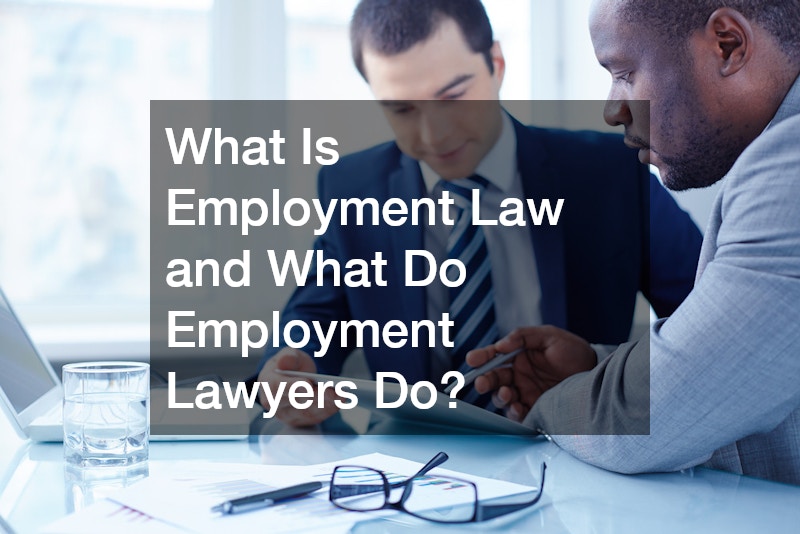
Employment law is a crucial branch of legal practice that governs the relationship between employers and employees. It encompasses a wide range of issues, from hiring practices and workplace safety to wage disputes and wrongful termination. As workplaces evolve and labor markets become more dynamic, the role of employment law becomes increasingly significant in ensuring fair treatment, protecting rights, and maintaining harmonious work environments. Employment lawyers specialize in this field, providing expertise and guidance to both employers and employees navigating the complexities of labor regulations.
Understanding Employment Law
At its core, employment law is designed to regulate the rights and obligations of employers and employees. It establishes the legal framework that dictates how businesses operate concerning their workforce and ensures that employees are treated fairly and without discrimination.
Key areas covered under employment law include:
Anti-Discrimination Laws: These laws prohibit discrimination based on race, gender, age, religion, disability, and other protected characteristics. They ensure that all employees have equal opportunities in hiring, promotion, and compensation.
Wage and Hour Regulations: Employment law sets standards for minimum wage, overtime pay, and working hours. It ensures that employees are compensated fairly for their work and that employers adhere to labor standards.
Employment Contracts: These laws govern the creation, enforcement, and termination of employment agreements. They define the terms of employment, including job responsibilities, compensation, benefits, and grounds for termination.
Workplace Safety: Under laws like the Occupational Safety and Health Act (OSHA), employers are required to provide a safe working environment. This includes minimizing workplace hazards and ensuring employees receive proper safety training.
Family and Medical Leave: Legislation such as the Family and Medical Leave Act (FMLA) allows employees to take unpaid leave for specific family and medical reasons without the risk of losing their job.
Termination and Wrongful Dismissal: Employment law outlines the lawful reasons for terminating employment and protects employees from being dismissed unlawfully or without proper notice.
Employee Benefits and Pensions: These laws regulate the provision of benefits like health insurance, retirement plans, and other perks, ensuring that employees receive what they are entitled to.
The Role of Employment Lawyers
Employment lawyers are legal professionals who specialize in interpreting, advising, and litigating issues related to employment law. Their expertise is essential for both employers and employees to navigate the intricate legal landscape of the workplace. Here are the primary functions and responsibilities of employment lawyers:
1. Advising Employers
Employers often consult employment lawyers to ensure that their workplace policies and practices comply with current laws. This includes drafting employee handbooks, creating non-discrimination policies, and developing procedures for handling grievances and disciplinary actions. Employment lawyers help employers:
Develop Compliance Strategies: They assist businesses in understanding and adhering to federal, state, and local employment laws to avoid legal pitfalls.
Draft Employment Contracts: Lawyers ensure that employment agreements are legally sound, clearly outlining the rights and responsibilities of both parties.
Handle Employment Disputes: When conflicts arise, such as allegations of wrongful termination or discrimination, employment lawyers represent employers in negotiations or litigation to resolve these issues effectively.
2. Representing Employees
Employees facing workplace issues seek the expertise of employment lawyers to protect their rights and seek redress. Employment lawyers advocate for employees in various situations, including:
Discrimination Claims: They help employees file complaints or lawsuits against employers who have violated anti-discrimination laws.
Wage and Hour Disputes: Lawyers assist in cases where employees have not been paid correctly for their work, including unpaid overtime or minimum wage violations.
Wrongful Termination: If an employee believes they were unjustly fired, an employment lawyer can help them pursue legal action to seek compensation or reinstatement.
Harassment Cases: Employment lawyers support employees who have experienced harassment in the workplace, ensuring that their cases are heard and addressed appropriately.
3. Mediation and Negotiation
Employment lawyers often act as mediators between employers and employees to resolve disputes without resorting to litigation. Through negotiation, they strive to reach amicable solutions that satisfy both parties. This approach can save time, reduce legal costs, and preserve professional relationships.
4. Litigation
When disputes cannot be resolved through negotiation or mediation, employment lawyers represent their clients in court. They prepare legal documents, gather evidence, and present arguments to defend or prosecute claims related to employment law. Effective litigation requires a deep understanding of legal precedents, procedural rules, and persuasive advocacy skills.
5. Staying Updated on Legal Changes
Employment laws are subject to change due to new legislation, court rulings, and evolving societal norms. Employment lawyers stay abreast of these developments to provide accurate and current advice. Their ongoing education ensures that clients are informed about their rights and obligations under the latest legal standards.
Watch the video above to learn more!
.




